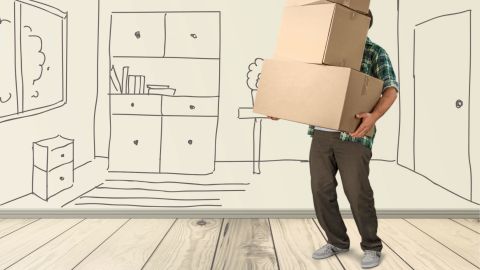The Unbearable Lightness of Moving

In Inside Out, this summer’s fantastic Pixar film about the fraught emotional landscape of childhood, a girl named Riley gets hauled away from her idyllic life in Minnesota to a very-foreign-seeming San Francisco, where the kids are snarky and unwholesome and the pizza is plagued with broccoli.
This week’s Praxis comes three days late because our family just completed a move of our own during which I was indisposed and untethered to the Internet. Not a cross-country journey, but a traipse of nine-tenths of a mile from one Brooklyn neighborhood to another. Our 1,190-square-foot apartment that had served us well for 16 years — first as a young married couple, and then, with increasingly ludicrous (ingenious?) renovations and reimaginings, as parents to one, two, three girls — had grown a bit cramped.
The move happened fast. We settled on the place in July, when I was feverishly writing a book about the Supreme Court term that wrapped up at the end of June. When I finished the manuscript on July 31st, I laid down the laptop and immediately picked up a brush, and spent the next 10 days painting the new house. Three days later, the movers arrived. Our decade-and-a-half-plus of accumulated possessions were swiftly deposited into 234 boxes, loaded onto a truck and delivered to our new address.
Buddhist teachings about impermanence counsel that constant change is definitive of existence. The river you dip your foot into now is not the same river a day — or a second — later. We are mistaken if we think that moving only happens on Moving Day. Life is movement.
Hard to argue with that. But some days seem more moving than others, and one gets a clearer view of what it means to move while watching four men pack away your tons of earthly possessions. The clearing happens fast. Several walls of books are reduced to a hundred-plus boxes in no time, like a wooden home being swallowed up by a swarm of termites. All those sweaters are tossed into a couple dozen linen boxes. The china cabinet takes longer, as each item needs to be wrapped individually and placed just so in a large, heavy box. But in the course of eight hours, what you thought was an impossible task is all done. There it is: your stuff, all of it, sorted into a breathtaking, but finite collection of cartons.
Many people remark that moving makes them feel burdened under the weight of their things. I felt that way at times, too, as when the crack Uzbecki movers would admonish us for having “so many books” or “too many dishes.” They were right, of course. But when the truck was all empty at the end of the day, furniture and boxes all shoved into the new place, I was left with a spring in my step and a feeling of amazement that the huge job was done — that a team of hard-working and good-spirited men could dislodge, wrap and transport all of our stuff in the course of two short days. No matter how heavy the burden, I thought, it can be carried.
In 1984, Milan Kundera published The Unbearable Lightness of Being, a story of people with various perspectives toward life baggage living intersecting lives in Czechoslovakia during the Prague Spring of 1968. Tomas, the philandering surgeon who married Tereza but cannot give up his other lovers, represents a challenge to the Nietzschean notion of “eternal recurrence,” the idea that there is nothing new under the sun. For Tomas, there is only today and tomorrow, only one life, and no way to judge one’s life path in reference to alternatives. The unbearable lightness of his being brings misery to Tereza, a world-weary figure who tries her hand at Tomas’s libertinism only to cast herself further asea.
I was reminded of this early Kundera novel over the weekend when my cheery view on the lightness of our short move to a nicer, bigger space did little to cheer up our older two children. It had suddenly hit them that their childhood home — the familiar, beloved place where they learned to walk, played, fought, and made all manner of memories for 7 and 11 years — was now a piece of their history. The girls will grow to love their new home, of course, but for now they’re caught under the weight of the idea that an era of their lives has passed by. When I think about that myself now, writing those lines, the move starts to feel a little heavier to me too.
Time to unpack another box.
Image credit: Shutterstock
Follow Steven Mazie on Twitter:@stevenmazie




